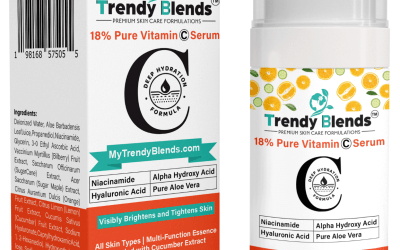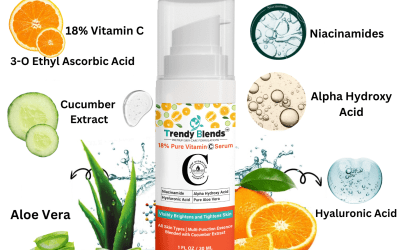Why is Vitamin C Serum So Important in Everyday Skin Care?

Why is Vitamin C Serum So Important in Everyday Skin Care?
Vitamin C Serum, a powerful antioxidant, plays a pivotal role in maintaining healthy, glowing skin. It’s no wonder that this superstar ingredient tops the list of must-have elements in many skin care routines. When combined with other key ingredients like hyaluronic acid and niacinamide, the benefits multiply, leading to a comprehensive approach to skincare. This article aims to shed light on why Vitamin C is crucial for your daily skin care regimen and how to effectively incorporate it with other potent ingredients.
 The Power of Vitamin C Serum for Skin Health
The Power of Vitamin C Serum for Skin Health
Vitamin C, also known as ascorbic acid, boasts a myriad of benefits that can significantly enhance your skin’s appearance and health. Here are some of the top reasons to prioritize Vitamin C in your skin care routine:
- Antioxidant Protection: Vitamin C Serum helps protect your skin from the damaging effects of free radicals caused by UV exposure and pollution.
- Collagen Synthesis: As a critical player in collagen production, Vitamin C assists in maintaining the skin’s elasticity and firmness.
- Brightening Effect: It diminishes dark spots and pigmentation, leading to a more even skin tone and a bright, radiant complexion.
- Hydration Boost: While Vitamin C itself doesn’t provide hydration, it enhances the penetration and efficacy of hydrating ingredients like hyaluronic acid.
- Anti-inflammatory Properties: Vitamin C reduces redness and soothes inflamed skin, making it a great option for managing conditions like acne.
Here’s a simple table to summarize the key benefits of Vitamin C for your skin:
| Benefit | Description |
|---|---|
| Antioxidant Protection | Shields against free radicals and environmental stressors |
| Collagen Production | Promotes skin elasticity and firmness |
| Brightening | Evens out skin tone and reduces hyperpigmentation |
| Hydration | Enhances effectiveness of other hydrating ingredients |
| Anti-inflammatory | Soothes irritation and reduces redness |
The Synergy of Vitamin C, Hyaluronic Acid, and Niacinamide
To truly unlock the potential of your skin care routine, combine Vitamin C with complementary ingredients like hyaluronic acid and niacinamide.
Hyaluronic Acid
Hyaluronic acid is a hydrating powerhouse that can hold up to 1,000 times its weight in water. Its ability to attract moisture makes it essential for achieving plump and youthful-looking skin. When used alongside Vitamin C, hyaluronic acid aids in maintaining skin hydration levels, preventing moisture loss, and enhancing overall skin texture.
Niacinamide
Also known as Vitamin B3, niacinamide has emerged as a popular ingredient in skin care for its various benefits. It helps regulate oil production, reduces the appearance of enlarged pores, and improves skin texture. Additionally, niacinamide possesses anti-inflammatory properties, making it an excellent companion for Vitamin C. Together, they create a balanced and effective routine that addresses multiple skin concerns.
How to Incorporate Vitamin C into Your Routine
Integrating Vitamin C into your daily skin care routine is essential for reaping its myriad benefits. Here’s a simple step-by-step guide:
- Start with a Cleanser: Use a gentle cleanser to remove impurities and prepare your skin.
- Apply Vitamin C Serum: Once your skin is clean and dry, apply a few drops of Vitamin C serum. Gently massage it into your skin using upward motions.
- Layer with Hyaluronic Acid: Follow up with a hyaluronic acid serum to lock in moisture.
- Use Niacinamide Cream: Next, apply a niacinamide cream or serum to help regulate oil and maintain an even skin tone.
- Moisturize: Use a hydrating moisturizer to create a protective barrier.
- Sunscreen is a Must: In the morning routine, always finish with a broad-spectrum sunscreen.
Tips for Selecting Vitamin C Products
- Look for L-Ascorbic Acid: This form of Vitamin C is the most effective but also the most unstable. Choose a serum with a concentration of 10-20%.
- Watch the Packaging: Vitamin C is sensitive to light and air. Opt for dark or opaque bottles to protect the formula.
- Check for pH: An ideal pH for Vitamin C products is between 3 and 4. This range allows for optimal absorption.
Relevant Quote
“Vitamin C is the fountain of youth, providing your skin with the nourishment it needs to stay vibrant and youthful.” – Skin Care Expert
Frequently Asked Questions (FAQs)
1. Can I use Vitamin C simultaneously with niacinamide?
Yes, you can! Both ingredients work effectively together to improve skin tone and texture when layered correctly.
2. How often should I use Vitamin C serum?
For the best results, use Vitamin C serum once or twice daily, ideally in the morning to take full advantage of its antioxidant protection against environmental stressors.
3. Can Vitamin C cause irritation?
While Vitamin C is generally safe, it can cause irritation, especially for individuals with sensitive skin. Start with a patch test and gradually incorporate it into your routine.
4. Will Vitamin C make my skin photosensitive?
Vitamin C is not inherently photosensitizing. However, it’s crucial to wear sunscreen during the day to protect your skin from UV rays.
5. How long will it take to see results from Vitamin C?
Typically, you can see noticeable improvements in skin tone and texture within 4-6 weeks of consistent usage.
Conclusion
Incorporating Vitamin C serum into your daily skin care routine is essential for maintaining vibrant and healthy skin. When blended with hyaluronic acid and niacinamide, you create a powerful trifecta that addresses hydration, brightening, and overall skin health. By understanding how these ingredients work together and following a structured routine, you’ll be well on your way to achieving that radiant glow you’ve always desired. Make Vitamin C a staple in your skin care arsenal, and watch your skin transform!







